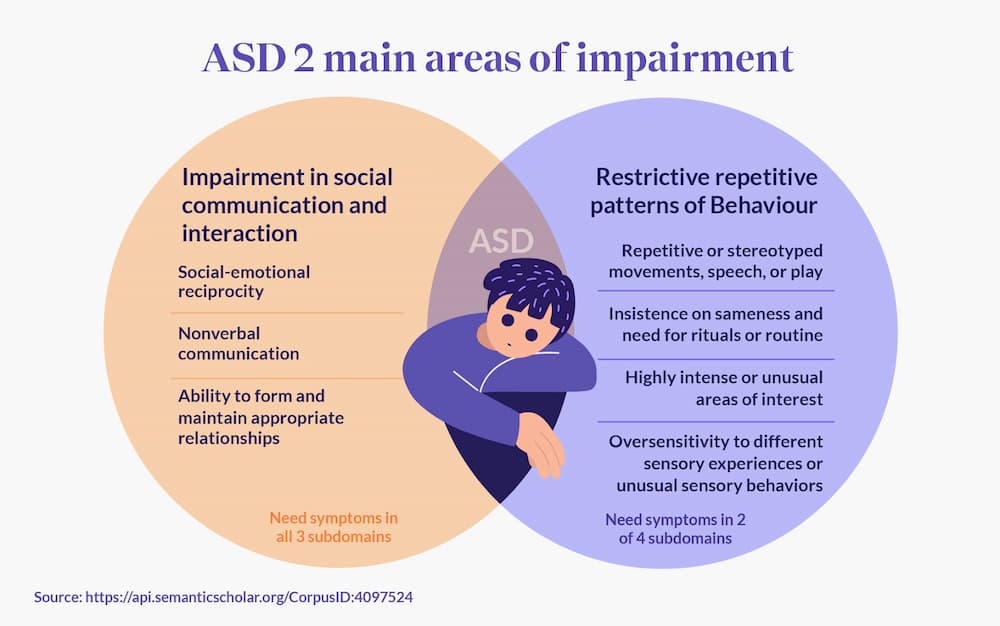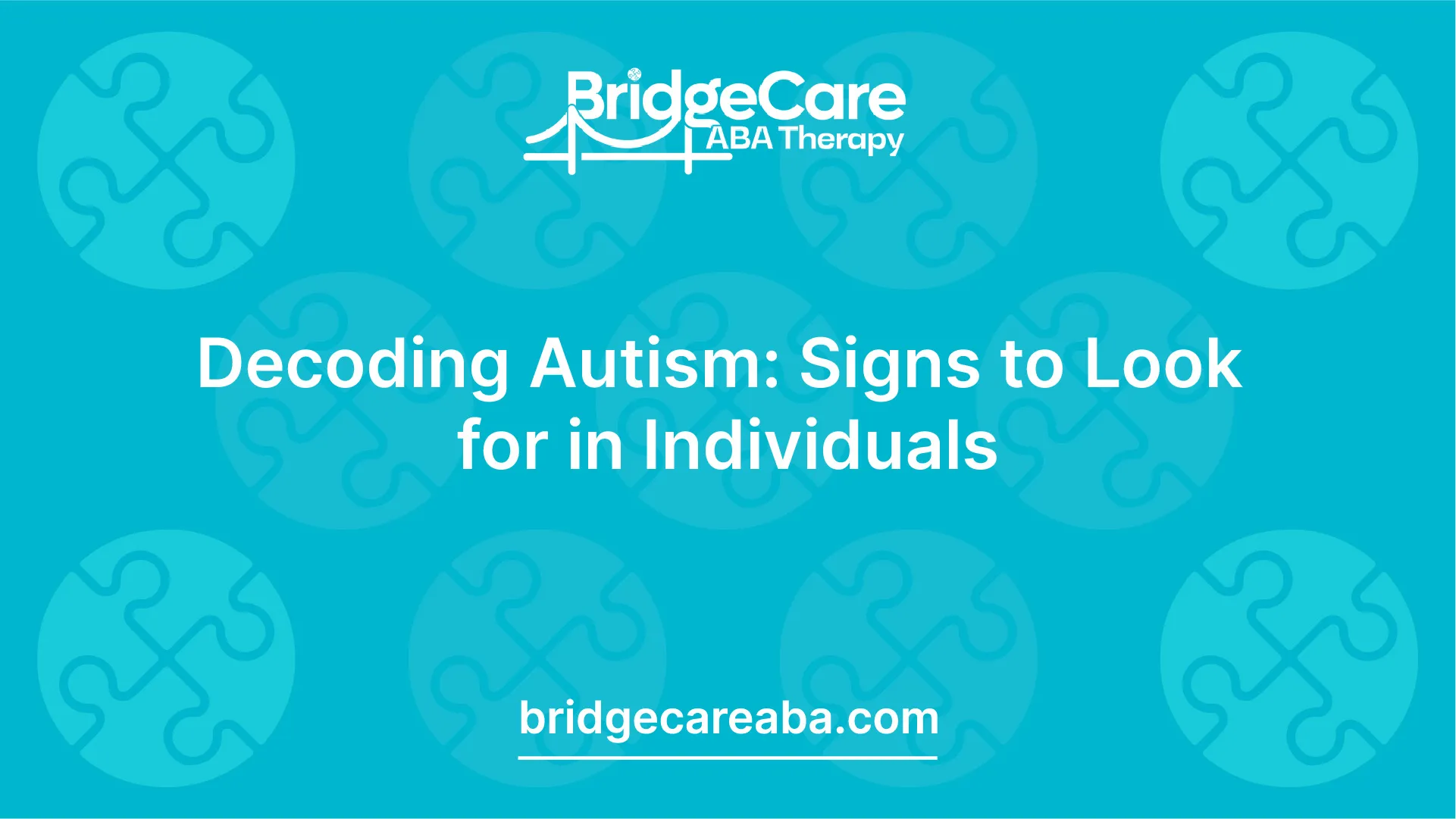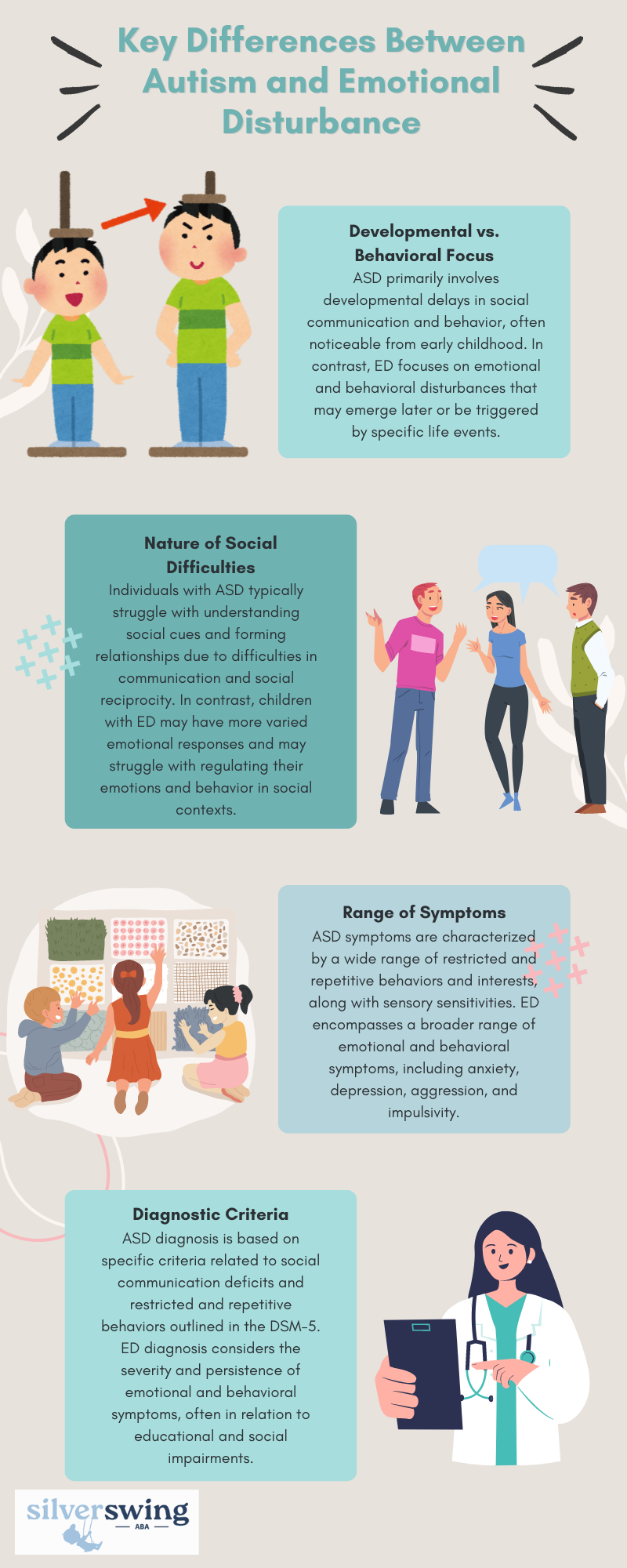Routine strategies that Autism Spectrum Therapies swear by
Routine strategies that Autism Spectrum Therapies swear by
Blog Article
Secret Symptoms And Signs to Acknowledge in People With Behavioral Autism
When you come across someone with behavior autism, acknowledging essential signs and symptoms is important. In addition, sensory level of sensitivities can lead to overwhelming experiences.
Obstacles in Social Communications
When you communicate with someone on the autism range, you could observe they struggle with social hints and interaction. These challenges can make social communications really feel overwhelming for them. You may see them avoiding eye call or standing also close or too away throughout discussions, which can create misunderstandings. They could not notice body movement or faces, making it harder for them to gauge how others are feeling.
Additionally, you might discover that they favor regimens and acquainted settings, which can restrict their desire to participate in brand-new social situations. They could speak about their rate of interests in wonderful information without discovering if you're interested when they do engage. This can bring about discriminatory conversations that leave you feeling detached. Comprehending these challenges can assist you approach communications with empathy and patience, cultivating a much more comfortable atmosphere for both of you.
Problem With Verbal and Non-Verbal Interaction

Identifying these signs is crucial, as it helps you far better support and engage with people on the autism spectrum. By recognizing their communication obstacles, you can cultivate a lot more purposeful connections and offer a much more supportive atmosphere.
Repetitive Actions and Regimens
Communication obstacles commonly go along with other signs of autism, such as repetitive behaviors and a strong preference for regimens. You could notice that people with autism typically take part in specific, repetitive activities, like hand-flapping, rocking, or duplicating expressions. These habits can give convenience and a sense of control in a commonly overwhelming globe.
Routines are just as vital; lots of people flourish when they adhere to an organized schedule. You may find that adjustments to these routines can lead to significant distress. If they have a day-to-day routine of eating breakfast at a details time or adhering to a particular course to college, any type of disruption can trigger anxiousness.
Recognizing these patterns aids you understand their behavior and offer assistance. By suiting their need for routine and permitting repetitive activities, you can develop a much more comfortable environment that alleviates their challenges.
Sensory Level Of Sensitivities

Common Sensory Triggers
Sensory level of sensitivities can significantly impact every day life for people with autism, as particular stimulations frequently activate overwhelming responses. Common sensory triggers include loud noises, intense lights, and strong smells. You may see that unexpected sounds, like sirens or alarm systems, trigger anxiety or distress. Fluorescent lighting in shops can feel severe and awkward. Structures can also play a significant duty; rough textiles or particular food appearances may be excruciating for you. Furthermore, crowded places can bewilder your senses, making it difficult to concentrate or loosen up. Understanding these triggers can aid you manage your environment much better. By being conscious of what influences you, you can take actions to minimize discomfort and enhance your everyday experiences.
Behavioral Responses Clarified
Comprehending your behavior responses to sensory level of sensitivities is essential, as they frequently expose how you interact with the globe. You may see that specific noises, lights, or structures overwhelm you, causing anxiousness or pain. When confronted with these stimuli, you could withdraw, cover your ears, or perhaps react boldy. These reactions aren't just traits; they're your means of coping with overstimulation. You might likewise locate on your own looking for specific sensory experiences, like deep stress or peaceful environments, to aid ground on your own. Acknowledging these patterns helps you recognize your needs much better and can assist exactly how you connect them to others. By acknowledging your sensory sensitivities, you can work home towards developing an atmosphere that feels a lot more comfy and manageable for you.
Coping Techniques Review
Recognizing your sensory level of sensitivities is just the first step; currently it's time to discover coping approaches that can assist you handle those experiences efficiently. Begin by creating a sensory toolkit tailored to your demands. Developing an organized regimen can additionally give predictability, lowering anxiousness around sensory overload.
Restricted Passions and Emphasis
While several people create a wide variety of rate of interests, those with autism commonly show restricted passions and an extreme concentrate on certain topics. You may notice that a person with autism can invest hours delving into their favorite subject, whether it's a certain kind of train, a specific flick, or a scientific principle. This extreme emphasis isn't just a leisure activity; it can come to be a central component of their identity and social communications.
You might discover that conversations revolve around these rate of interests, and they may battle to participate in wider subjects. For them, these focused interests supply comfort and a feeling of proficiency. While it is essential to encourage expedition of brand-new subjects, valuing their enthusiasms is similarly necessary. By comprehending and acknowledging these restricted interests, you can foster a supportive setting where they feel valued and understood, enabling even more purposeful links and interactions.
Psychological Guideline Problems
People with autism often face obstacles in Read More Here psychological regulation, which can be influenced by their extreme focus on particular interests. You might notice that when a person is deeply involved in a preferred activity, they can experience strong emotions, whether enjoyment or aggravation. This strength occasionally makes it difficult for them to shift equipments or handle their feelings when things do not go as intended.

Variability in Developing Turning Points
When it comes to developing landmarks, you'll observe that people with autism often reveal a wide variety of variability. You could see a youngster stand out in language skills yet battle with social interactions.
It's necessary to recognize that each individual's journey is one-of-a-kind. Some may establish complex abilities early, just to face difficulties later. Others might take longer to attain standard landmarks but after that grow in particular areas. Observing these patterns can aid you recognize their toughness and needs better.
Regularly Asked Concerns
Just How Is Autism Identified in Children and Adults?
To identify autism in kids and grownups, experts examine behavior, communication abilities, and social communications. If a private meets the criteria for autism spectrum condition., they typically use standard tests, meetings, and monitorings to identify.
Are There Various Types of Autism Spectrum Disorders?
Yes, there are different types of autism spectrum problems, consisting of Asperger's disorder and pervasive developmental disorder-not or else defined. Each type varies in severity and attributes, so understanding these distinctions can assist you far better assistance people with autism.
What Therapies Work for Individuals With Autism?
When taking into consideration effective treatments for people with autism, you'll discover alternatives like Applied Actions Evaluation, speech treatment, and job-related treatment. Each method can help enhance interaction, social skills, and daily working customized to private requirements.
Can People With Autism Lead Independent Lives?
Yes, people with autism can lead independent lives. With the appropriate assistance, abilities training, and sources, you can help them establish self-sufficiency, take care of daily tasks, and flourish in various atmospheres, promoting their independence.
How Can Households Support Liked Ones With Autism?
You can sustain your liked ones with autism by producing a structured environment, motivating their passions, exercising persistence, promoting communication, and advertising social skills. Celebrate their accomplishments, regardless of how tiny, and build an encouraging community.
Although lots of individuals on the autism spectrum can understand and use language, they often face significant difficulties with both non-verbal and verbal communication. Acknowledging these indicators is important, as it assists you far better assistance and engage with people on the autism range. You may see that individuals with autism usually involve in specific, repetitive activities, like hand-flapping, shaking, or repeating phrases.Sensory sensitivities can substantially influence day-to-day life for individuals with autism, as certain stimulations usually set off overwhelming responses.When it comes to click here for more developing turning points, you'll see that individuals with autism often reveal a vast array of irregularity.
Report this page